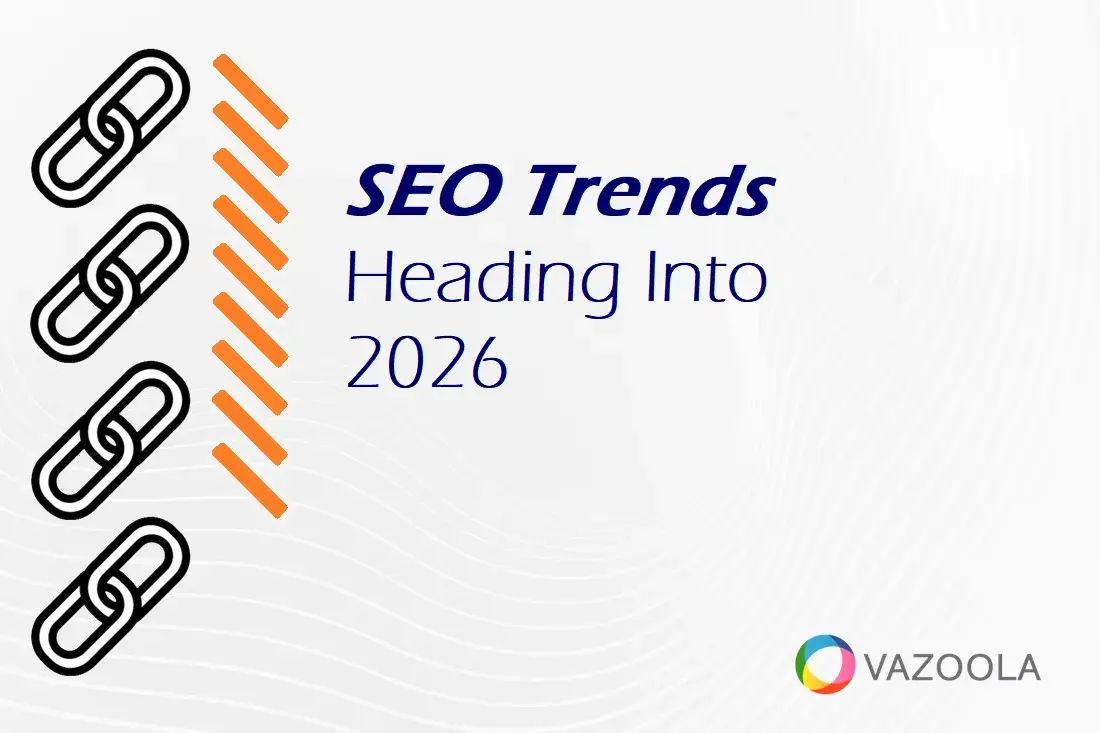SEO Trends Heading Into 2026 (And Where Link Building Fits In)
Nov 14, 2025
Written by Casey Bjorkdahl

Casey Bjorkdahl is one of the pioneering thought leaders in the SEO community. In 2010, Casey co-founded Vazoola after working for a Digital Marketing Agency for five years in New York City. Vazoola is now one of the fastest growing and most widely recognized SEO marketing firms in the country.

How will search change in 2026?
After all, search is moving faster than ever... and the rules keep shifting.
Generative AI now shapes how results appear, so marketers can’t rely on the same ol' playbook. Content creators, strategists, and business owners all face the same challenge: Your content now has to do so much more than just rank. It needs to answer real questions, show authority, and fit seamlessly into AI-driven search experiences.
So, what trends will define SEO in 2026? How can you start using them right now? And, yes – the big question – does link building still matter in a world where AI is rewriting the way people search?

Key Takeaways
-
Search engines will increasingly interpret intent over keywords.
-
AI-driven answers and zero-click formats will reshape how you get visibility.
-
E-E-A-T (experience, expertise, authority, trust) remains foundational.
-
Long-tail queries, UGC, and structured content will gain importance.
-
Link building still adds value—but you must align it with context, authority, and relevance.
Table of Contents

SEO Trends to Watch in 2026
Search is evolving faster than ever, and the changes in SEO are rewriting how marketers think about visibility. Old tactics are giving way to strategies that focus on intent, authority, and user experience.
How has SEO changed in recent years, and what will it look like in 2026?
The hottest SEO trends represent not just shifts in Google’s algorithm, but in how people consume and trust information online. Understanding these SEO developments now will help you create content that connects, performs, and withstands the rapid SEO changes coming in 2026.

Search Engines Better Interpret Search Intent
Search intent describes why a user types a query: Are they looking for information, comparing products, or ready to purchase?
Algorithms now use semantic models to infer context, reducing the emphasis on exact-match keywords.
The Takeaway for SEO
You must map content to intent types. Are they informational, navigational, or transactional? Use topic clusters and hub pages to signal context rather than repeating keywords. Monitor “People Also Ask” and query expansions for nuances.

That guide you wrote two years ago may still pull traffic, but is it tuned for today’s search intent? Give it a quarterly check-up. Small updates – new examples, a sharper CTA – can keep it relevant and ranking.
AI Overviews and Generative Answer Engines Take Over
“AI Overviews” or generative summaries now appear at the top of many query results, summarizing multiple pages and reducing clicks. According to Advanced Web Rating, more than half of all Google search results include AI Overviews, with that share growing.
What It Means for SEO Strategy
For a better shot at appearing in AI Overviews, optimize concise, authoritative answers (1–2 sentences) to commonly asked questions. Use schema (FAQ, Q&A) to increase chances of inclusion. Focus on content that AI will cite, not just rank.

If you’re only running FAQ schema, you’re leaving opportunities on the table. Add author, review, or product schema where it fits. Richer data gives you an edge when AI engines scan for trustworthy signals.
Zero-Click Searches Multiply
When the answer is already on the SERP (via featured snippets, knowledge panels, AI overviews), users don’t click. Bain and Company’s research found that 80% of consumers rely on “zero-click” results at least 40% of the time – and that was in 2024!
That doesn’t mean SEO is dead. It means visibility is shifting from clicks to brand presence and citations.
How This Impacts SEO
To effectively master zero-click strategies, craft content to win snippets (concise answers, tables, lists). Use branding and authority cues so people recognize you even if they don’t click. Monitor click vs impression ratios more closely.

Don’t just obsess over your rank. Take a hard look at how your brand shows up in search. Snippets, images, even AI summaries – these all shape first impressions. Sometimes visibility is just as powerful as the click.
E-E-A-T and Brand Authority Become More Critical
Google’s E-E-A-T (experience, expertise, authority, trust) continues to guide quality assessments. Search Quality Rater Guidelines show E-E-A-T is integral to human evaluation of content.
Key Actions for SEO Success
You can integrate E-E-A-T into your 2026 content when you show author credentials, cite trustworthy sources, and include original case studies. Build reputation across platforms (guest posts, social proof). Don’t forget to ensure site security, transparency, and consistency.

Want links without begging for them? Share your own data. Surveys, benchmarks, original research—it doesn’t just build authority, it makes your site the one others reference when they need stats.
Long-Tail Queries and Conversational Search Gain Ground
Voice search and conversational input push users toward longer, phrased queries rather than short keywords. Algorithms now parse modifiers, prepositions, and context more aggressively.
Applying This to Your SEO Strategy
You can boost your SEO success in 2026 by infusing your content with long-tail queries and conversational phrases. Include natural, question-style subheadings, and build your content around full phrases. Cover variations in phrasing and related keywords, then use conversational tone and logical structure.

Traffic is great, but behavior tells the real story. Are visitors scrolling, clicking, staying put—or bouncing in seconds? These signals speak louder than rankings when it comes to proving your content actually works.
User-Generated Content and Community Signals Gain Rank
Forums, reviews, comment sections, Reddit threads, and Q&A sites often rank well, especially for niche topics. Google considers signals from multiple platforms to assess authority and trust.
Where This Fits Into SEO
Include UGC in your SEO strategy throughout the coming year. Encourage user reviews, Q&A, and community discussion. Host forums or comment sections under moderation. Just make sure you’re leveraging UGC as content that can attract links and traffic organically.

Google and AI engines don’t just pull from your blog. They scan LinkedIn posts, YouTube videos, podcasts, and more. Keep your brand signals consistent across platforms so your authority gets reinforced everywhere people search.
User Experience and Core Web Vitals Still Matter
Page speed, interactivity, layout shift—all continue to influence rankings. AI bots need clean, lightweight pages to crawl and parse effectively.
How to Adjust Your SEO
You can enhance user experience by auditing and optimizing performance (lazy load, reduce JS bloat, compress images). Prioritize mobile performance and eliminate intrusive popups. It’s also important to track Core Web Vitals regularly.

How Does Link Building Fit Into Your 2026 SEO Strategy?
Link building remains one of the most powerful signals for authority… if done carefully.
As search engines grow more advanced, links not only signal popularity but also help confirm expertise and trustworthiness across the web. In 2026, links work alongside content quality, user experience, and brand reputation as part of a larger authority equation.
Building high-quality connections gives your site the validation it needs to be considered a reliable source in both traditional and AI-driven search results. But it’s still important to remember a few best practices:
-
Prioritize contextual, relevant links from sites in your domain or niche.
-
Earn links naturally through valuable content, case studies, data reports, or tools.
-
Use link earning rather than mass outreach for links without value.
-
Focus on links that complement context and help AI or bots corroborate authority.
-
Monitor your link profile regularly and disavow low-quality links.
-
Combine link efforts with content updates: fresh, linkworthy assets get more attention.
On balance, links still help reinforce trust, especially when search engines rely more on authority and brand consensus.

Value, Authority, and Trust in SEO

As you plan for 2026, consider how every piece of content you create signals value, authority, and trust.
SEO today is no longer about chasing keywords; it is about proving relevance across every touchpoint. Those who adapt will not only capture clicks but also shape how their brand is understood and remembered in an AI-driven search world. It’s the future of SEO.

